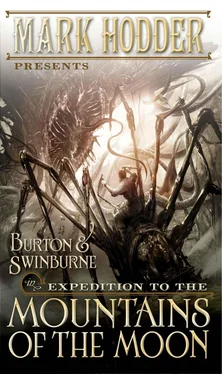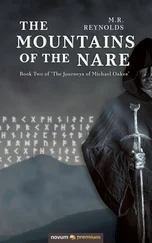Mark Hodder - Expedition to the Mountains of the Moon
Здесь есть возможность читать онлайн «Mark Hodder - Expedition to the Mountains of the Moon» весь текст электронной книги совершенно бесплатно (целиком полную версию без сокращений). В некоторых случаях можно слушать аудио, скачать через торрент в формате fb2 и присутствует краткое содержание. Жанр: sf_stimpank, на английском языке. Описание произведения, (предисловие) а так же отзывы посетителей доступны на портале библиотеки ЛибКат.
- Название:Expedition to the Mountains of the Moon
- Автор:
- Жанр:
- Год:неизвестен
- ISBN:нет данных
- Рейтинг книги:5 / 5. Голосов: 1
-
Избранное:Добавить в избранное
- Отзывы:
-
Ваша оценка:
- 100
- 1
- 2
- 3
- 4
- 5
Expedition to the Mountains of the Moon: краткое содержание, описание и аннотация
Предлагаем к чтению аннотацию, описание, краткое содержание или предисловие (зависит от того, что написал сам автор книги «Expedition to the Mountains of the Moon»). Если вы не нашли необходимую информацию о книге — напишите в комментариях, мы постараемся отыскать её.
Expedition to the Mountains of the Moon — читать онлайн бесплатно полную книгу (весь текст) целиком
Ниже представлен текст книги, разбитый по страницам. Система сохранения места последней прочитанной страницы, позволяет с удобством читать онлайн бесплатно книгу «Expedition to the Mountains of the Moon», без необходимости каждый раз заново искать на чём Вы остановились. Поставьте закладку, и сможете в любой момент перейти на страницу, на которой закончили чтение.
Интервал:
Закладка:
“They don't look at all happy about it.”
“This isn't an easy country, as you know better than most. Dysentery, malaria, tsetse flies, mosquitoes, jigger fleas-the majority of the white men are as sick as dogs. As for the Africans, they're all serial deserters. There should be double the number of soldiers you see here.”
They passed alongside a pen of oxen. One of the animals was lying dead, its carcass stinking and beginning to swell.
“Do you have a thing about poppies?” Wells asked. “You pulled one from your pocket just before we got bombed, and now I see you have a fresh one pinned to your lapel.”
“I think-I have a feeling-that is to say-the flower seems as if it should mean something.”
“I believe it symbolises sleep-or death,” Wells responded.
“No, not that,” Burton said. “Something else, but I can't put my finger on it.”
“So you're still having trouble with your memory, then? I was hoping it'd returned. As you might imagine, I've been beside myself with curiosity these past few days. I have so many questions to ask.”
“Odd scraps of it are back,” Burton replied. “It's a peculiar sensation. I feel thoroughly disassembled. I'll submit to your interrogation, but if you manage to get anything out of me, you must keep it to yourself.”
“I have little choice. If I publicised the fact that you're alive, my editor would laugh me right out of the news office and straight into the European Resistance, from which I'd never be seen again.” Wells jerked his head, coughed, and spat. “These bloody flies! They're all over me! The moment I open my mouth, there's always one eager to buzz into it!” He saluted a passing officer, then said, “So what happened? Did some quirk of nature render you immortal, Richard? Did you fake your own death in 1890?”
“No. I have the impression that I came here directly from the year 1863.”
“What? You stepped straight from three years before I was born into the here and now? By what means?”
“I don't know.”
“Then why?”
“I don't know that, either. I'm not even sure which future this is.”
“Which future? What on earth does that mean?”
“Again, I don't know-but I feel sure there are alternatives.”
Wells shook his head. “My goodness. The impossibilities are accumulating. Yet here you are.”
“Here I am,” Burton agreed.
“An anachronic man,” Wells muttered. He stopped to adjust his crutches.
Moans emerged from a nearby tent, its inhabitant obviously wracked by fever. The sound of his misery was drowned out as a group of Askaris filed past, singing a mournful song. Burton listened, fascinated by their deep voices, and was able to identify the language as Kichagga, a dialect of Kiswahili, which suggested the men were from the Chagga tribes that originated in the north, from the lands below the Kilima Njaro mountain.
They were far from home.
So was he.
“I once discussed the possibility of journeying through time with young Huxley,” Wells said, as the two of them got moving again. “It was his assertion that no method would ever be invented, for, if it were, then surely we'd have been overrun by visitors from the future. It didn't occur to either of us that they'd actually come from the past. You say you don't know how it was achieved? But was it through mechanical means or a-I don't know-a mental technique?”
“I have no idea. Who's Huxley?”
“A boy I was acquainted with. He had a prodigious intellect, though he was almost entirely blind and hardly out of short trousers. He was killed when the Hun destroyed London. I don't understand, Richard-how could movement through time have been possible in the 1860s yet remain a secret today?”
“My guess is that-that-that-wait-who is-was-is Palmerston?”
“Pah! That villain! In your day, he was prime minister.”
“Yes!” Burton cried. “Yes! I remember now! He had a face like a waxwork!”
“What about him?”
“I think he might have suppressed the fact that the boundaries of time can be breached.”
“The devil you say! I should have known! That wily old goat! Does he know you're here?”
“Not to my knowledge.”
“Maybe my editor would help you to contact him.”
“I have no means of sending a communique into the past.”
“I mean now, here in 1914.”
Burton exclaimed, “Surely you don't mean to suggest that he's still alive?”
“Ah. You didn't know. Yes, he's with us. Famously so. Or perhaps ‘notoriously so’ would be a more accurate assessment. He's a hundred and thirty years old!”
“Bismillah!” Burton gasped. “Palmerston! Alive! Is he still prime minister?”
“No, of course not. There's been no such thing since the Germans overran Europe. And let me tell you: few men who ever lived have had as much blood on their hands as Palmerston. He called us to war. We were making the future, he said, and hardly any of us troubled to think what future we were making.” Wells waved his hand at the tents that surrounded them. “Behold!”
Burton looked puzzled. “But there's more than this, surely? What of the Empire?”
Wells stopped in his tracks. “Richard,” he said quietly. “You have to understand. This is it.”
“It?”
“All that remains. The men commanding these two battalions of Askaris, plus perhaps three thousand in the British Indian Expeditionary Force, scattered groups of soldiers around the Lake Regions, maybe twenty thousand civilians and Technologists in our stronghold at Tabora, and whatever's left of the British European Resistance-there's nothing else.”
Burton looked shocked. “This is the Empire? What in heaven's name happened?”
“As I told you before, it all began here. By the 1870s, despite the efforts of Al-Manat, the German presence in Africa was growing. Palmerston was convinced that Bismarck intended a full-scale invasion. He believed that Germany was seeking to establish an empire as big as ours, so he posted a couple of battalions over here to prevent that from happening. The Hun responded by arming the natives, setting them against us. The conflict escalated. Palmerston sent more and more soldiers. Then, in 1900, Germany suddenly mobilised all its forces, including its Eugenicist weapons-but not here. It turns out that Bismarck never wanted Africa. He wanted Europe. France fell, then Belgium, then Denmark, then Austria-Hungary, then Serbia. The devastation was horrific. Britain fought wildly for five years, but our Army was divided. Almost a third of it was here, and when they tried to get home, Germany blockaded all the African ports. My God, what a consummate tactician Bismarck was! We didn't stand a chance. Then he gained Russia as an ally, and we were conquered. India, Australia, South Africa, and the West Indies all quickly declared their independence, British North America fell to a native and slave uprising, and the Empire disintegrated.”
Burton sent a breath whistling through his teeth. “And Palmerston was to blame?”
“Completely. His foreign policy was misjudged in the extreme. No one really understands why he was so obsessed with Africa. A great many Britishers have called for him to be tried and executed. After all, it's not reasonable that those who gamble with men's lives should not pay with their own, and he was the greatest gambler of them all. But Crowley insists that he should be kept alive-that, somehow, the survival of Tabora, the last British city, depends on him.”
They reached an area where the tents thinned out and row after row of Mark II Scorpion Tanks were parked, hunkered down on their legs, claws tucked in, tails curled up.
Burton noted that, though the war machines' design was new to him, the technology appeared to have advanced little since his own age.
Читать дальшеИнтервал:
Закладка:
Похожие книги на «Expedition to the Mountains of the Moon»
Представляем Вашему вниманию похожие книги на «Expedition to the Mountains of the Moon» списком для выбора. Мы отобрали схожую по названию и смыслу литературу в надежде предоставить читателям больше вариантов отыскать новые, интересные, ещё непрочитанные произведения.
Обсуждение, отзывы о книге «Expedition to the Mountains of the Moon» и просто собственные мнения читателей. Оставьте ваши комментарии, напишите, что Вы думаете о произведении, его смысле или главных героях. Укажите что конкретно понравилось, а что нет, и почему Вы так считаете.












